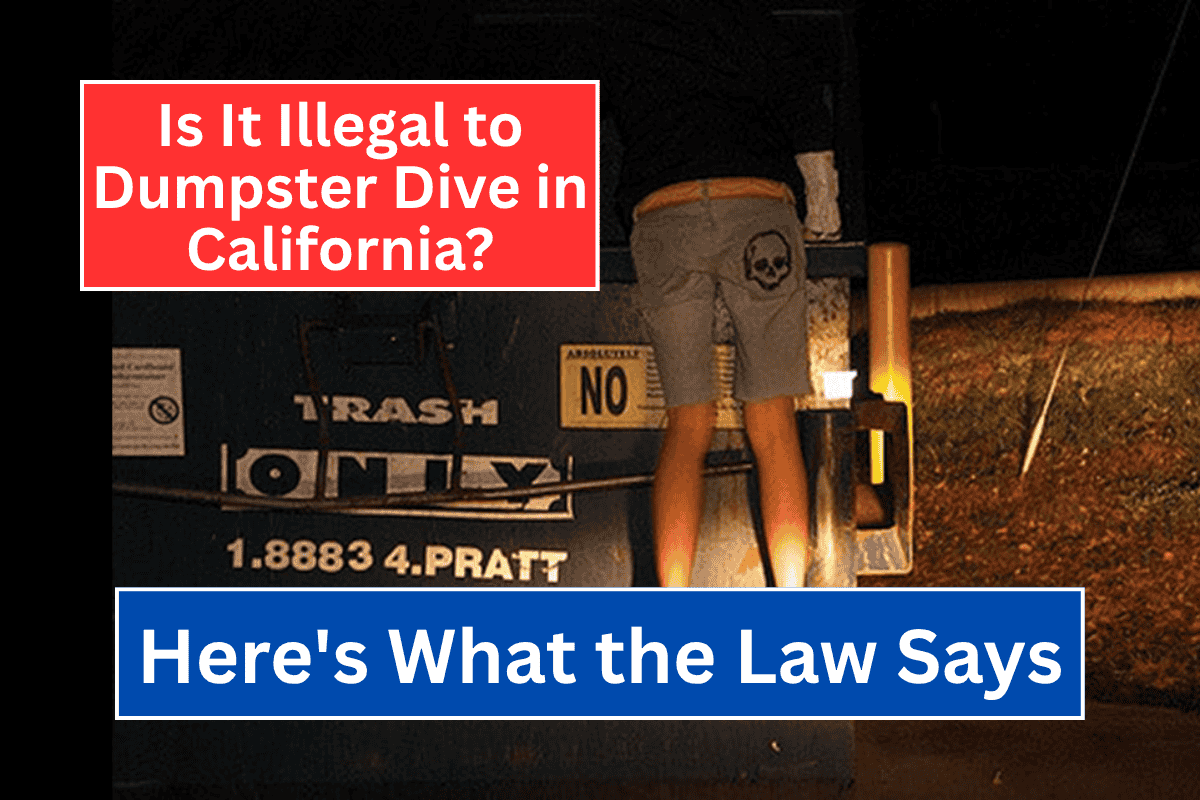Dumpster diving in California is generally legal, but there are several important rules and local ordinances to be aware of depending on where you are. While the practice is typically allowed in public spaces, diving on private property or in certain commercial areas can lead to legal consequences.
Let’s break down what you need to know about dumpster diving laws in California, including where it’s legal, where it’s prohibited, and what property owners can do to prevent it.
What is Dumpster Diving in California?
Dumpster diving refers to the act of retrieving discarded items from trash bins, dumpsters, or donation sites. Whether it’s food, furniture, or electronics, many people view dumpster diving as a form of recycling and resourcefulness.
However, it’s not as simple as just picking up trash—California’s legal framework varies greatly based on location, type of property, and local ordinances.
Is Dumpster Diving Legal in California?
In general, dumpster diving in California is legal once trash is placed in a public space. This was established in the landmark 1988 Supreme Court case California v. Greenwood, which ruled that “once trash is placed in a public space, it’s free for anyone to take.” However, there are some nuances to be aware of.
Where is Dumpster Diving Legal in California?
Public Property: Dumpster diving on public property is generally allowed in California. However, each city may have its own regulations, such as restrictions on hours or types of dumpsters.
Public areas like parks, town walkways, or waste disposal sites may allow diving, provided there are no signs prohibiting it, and the dumpsters are not locked.
Commercial Districts: Certain areas behind businesses or in commercial districts may be considered public property, allowing access to dumpsters. However, it’s important to look for any posted “No Trespassing” signs or restrictions before diving.
When is Dumpster Diving Illegal?
Private Property: Dumpster diving on private property, such as in business parking lots or residential areas, is considered trespassing unless the property owner has granted permission. If the area has a “No Trespassing” sign, or the dumpster is located behind a gate or is locked, diving is prohibited. Trespassing is a violation under California Penal Code 602, which could lead to fines or even jail time.
Locked Dumpsters: Forcing entry into a locked dumpster is a form of vandalism or theft, and is considered a misdemeanor. Damaging locks or gates to gain access to a dumpster can result in criminal charges.
Commercial Property: Dumpster diving is often illegal on commercial properties, such as large retail stores like Walmart, Target, and Costco. Many businesses put up signs or place dumpsters in areas that require permission to access. These businesses have policies to prevent dumpster diving for reasons ranging from health regulations to liability concerns.
Residential Areas: In gated or controlled-access residential communities, dumpsters are typically locked or enclosed within gates. Entering these areas without permission can be considered trespassing.
City-Specific Dumpster Diving Laws
Different cities in California may have varying rules regarding dumpster diving. Here’s a look at some common locations:
Los Angeles: Legal in back alleys of small businesses; illegal at major department stores and prohibited from 10 pm to 6 am.
San Diego: Legal behind small grocery stores; illegal near high-end malls and military bases.
San Francisco: Legal in residential areas; illegal at high-security tech campuses like Google.
Fresno: Legal at farms and produce markets; illegal at shopping malls.
Sacramento: Legal at local restaurants and markets; illegal near government buildings.
San Bernardino: Legal in suburban sprawl areas; illegal at corporate chains like Walmart.
For other cities, make sure to check local ordinances for specific rules regarding dumpster diving.
Why Do Property Owners Want to Stop Dumpster Diving?
While dumpster diving can be seen as a form of recycling, property owners have valid concerns. If an injury occurs while someone is diving in their dumpster, the property owner may be held liable.
Additionally, dumpsters can contain hazardous materials such as broken glass or chemicals, and divers may damage property or access sensitive personal information.
John Mohon, a retired police officer, notes the potential dangers, sharing a story of a man who tragically died after getting trapped while trying to stay warm in a donation receptacle. This highlights why businesses may take preventive measures to avoid reputational damage and legal liability.
How Can Property Owners Prevent Dumpster Diving?
To deter dumpster diving, property owners can implement several security measures:
Locks and Barriers: Secure dumpsters with strong locks or gates to prevent unauthorized access.
Trash Compactors: Use trash compactors to reduce the amount of trash that can be sifted through, making it harder for divers to find usable items.
No Dumpster Diving Signs: Place clear, visible signs near dumpsters and on properties warning against unauthorized access.
CCTV Cameras: Install surveillance cameras, particularly PTZ (pan-tilt-zoom) cameras, to monitor areas around dumpsters. Advanced security systems can even detect suspicious behavior and alert property owners in real time.
AI-Powered Security: Integrate AI-driven security systems that use video monitoring to detect and discourage dumpster diving.
Dumpster diving in California is generally legal, but there are a number of important restrictions and rules to follow. While public spaces often allow dumpster diving, private property and locked dumpsters are strictly off-limits.
Property owners who want to prevent dumpster diving can employ various security measures to ensure their property remains safe and secure. Always check local laws to ensure compliance, and if you’re unsure, it’s better to err on the side of caution.












